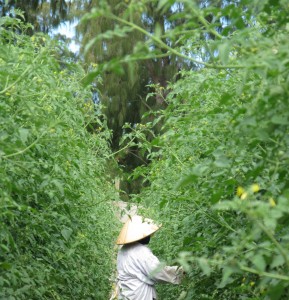On the Future: Cultivating Farms and Compassionate Community
That afternoon in Kahuku, our conversation with Shin and her mom Le Xieng encompassed topics and realms well beyond their farm and farming. Wide and deep, just as their hopes for the future involve not just their own success, but also the success of fellow family farms.
As we walked the acres of their farm – the rows of varieties of cherry tomatoes, long round squash and Japanese cucumbers, green-housed and open field – our conversation quickly went from peering into the past to brainstorming on the future. History. The closer you look, it starts to show you more. Underneath the words and the timelines, we find the human and we find our symbiotic relationship with nature.
It was amazing to hear about the Ho family’s journey into farming. That whole era of their own farm’s beginning marks the start of a particular resurgence from city to farm. In these same decades that we lost thousands of American farms, others began to take hold and slowly grow. Women across the country began to make their way into farming American soil and so did many families relocating from Southeast Asia.
In 1996, I was working with filmmaker Spencer Nakasako on a video diary documentary that focused on a young couple starting a family and trying to make it work in East Oakland. What made their story even more compelling was that while they were going through the throes of teenage parenthood, they were also helping their families navigate a new culture. The video diarists, Kelly and Tony, were part of a diverse community who migrated from Laos during the last two decades: Laotian, ethnic Chinese, Iu Mien, Hmong, and many more.
These were the communities caught in the middle of the volatile aftermath of the Vietnam War and the struggle for political control. During this time, I heard of how thousands of families from Laos were being relocated into regions all over the country, from Minneapolis to Oakland. They came from both urban and rural areas. They came from backgrounds that ranged from highly technical to commercial to agrarian and the arts. What struck me even then was how even in Oakland, many found ways to farm. Out of survival, necessity, and out of a deep connection to land and nature, these families brought with them the belief that fresh food is integral to keeping one’s good health and connection to culture.
Like the Ho’s, and yours and mine, every family has a different story. The more we know, the more we can appreciate. The more we can figure out ways to help each other too.
The Ho’s deeply held desire to help fellow small farmers brought something amazing to our attention: Southeast Asian family farms are an integral part of our foodshed. These farms are not focusing their energy on growing cash crops for export. They are supplying us with our dinner basics: green onion, onion, ginger, choy sum, ungchoi, daikon, cabbage, beets, lettuce, papaya, banana. At the farmers markets that I help to manage, of our anchor farmers more than half are part of the Southeast Asian community. If we are talking about growing our foodshed we need to support these farmers who are already so to say “on the ground and growing.”
The Southeast Asian farming families represent the next wave and they have made a positive impact on Hawaii’s agriculture. They have the work ethic and a strong desire, two key ingredients needed to succeed in this very difficult industry.
We’ll be continuing the conversation, sharing it here with you and involving you in these efforts, as we listen and learn more about how we can all support these family farms who are currently in a position to become even greater contributors to our local foodshed. Let’s take a deeper look at how we can support these farmers so that they will remain viable and be successful. Lisa Asagi- She grows food correspondent
Haven’t seen Part One? Go here.


2 replies on “Mother Daughter Series: Shin and Le Xieng Ho, Part Two”
[…] out Part Two of Ho Farm’s mother and daughter team – we talk about the future of their farm, farming in […]
Terrific story of past, present, and future of truck crop farming on Oahu from a wonderful mother and daughter. I loved it!